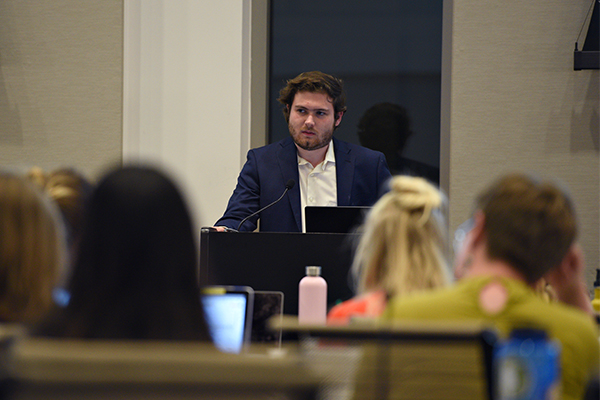The Senate of College Councils’ vice president-elect and president-elect resigned Wednesday and Thursday, respectively, leading to a new nomination at the Senate meeting Thursday evening. The special election will take place next Thursday.
The resignations of the elected students came after many members of Senate abstained from voting on March 14 in hope of invalidating the Senate election. Some councils expressed concerns that some of the candidates nominated did not include diversity as platform points and did not have enough experience to hold the positions they were nominated for, members of the Senate said.
“During last cycle’s election, there had been a question brought up … about what exactly the effect of (abstained votes) would be if enough of them accrued,” Senate president David Jenkins said.
While members thought their abstention votes would invalidate the election by not having a quorum, Jenkins said the Dean of Students decided the election results were still legitimate. Neuroscience junior Christopher Apgar was chosen as president-elect, and Praveena Javvadi, a government and plan II junior, was chosen as vice president-elect.
“Once (the Dean of Students) came back with the ruling, and it turned out to be contrary to what many of the voting delegates believed, they asked (if) since they had already cast their votes, and with a new understanding of what that meant, if they would be allowed to recast their votes,” Jenkins said. “The (Dean of Students’) decision was no … It’s essentially just been a process of councils wanting to find some sort of way to redo the votes so they can feel that they’ve been properly represented despite the ruling placed down by the (Dean of Students).”
Javvadi said she was uncomfortable keeping her position as vice president-elect knowing some councils did not feel their voices were accurately represented in the election. Since they could not revote, Javvadi said she decided to resign.
“Although I initially believed that remaining in the vice president position would be the best course of action in response to these problems, my feelings have changed,” Javvadi said in her resignation email Wednesday. “Of the many problems that have arose, the inability of all councils being able to vote has been a deep concern of mine, and I personally feel uncomfortable serving on a board that was not correctly voted upon.”
Following Javvadi’s resignation, Apgar resigned Thursday.
Vik Shirvaikar, financial director for the Natural Sciences Council, proposed Senate Bill 1802 which would allow members of the Senate to make a motion of no confidence for the president-elect or vice president-elect. This would nullify the results of the election for that position and open a new nomination period. SB 1802 was fast-tracked and passed.
“The goal was to make sure the councils have an opportunity to voice such an opinion in the election, because it was established in our previous election by the Dean of Students that no actual method for a vote of no confidence existed under the current election code,” Shirvaikar said.
Shirvaikar said the bill may not be implemented by next week’s election because it has to be approved by the Dean of Students, the Office of the Vice President for Legal Affairs and the Office of the President.
The new nominees for president are Michaela Lavelle, Elena Ivanova and Apgar. The nominees for vice president are Katherine Lee, Ryan Jaffe wand Javvadi.
If no candidate receives a 50 percent majority in the election next Thursday, the election will move to a runoff.





















